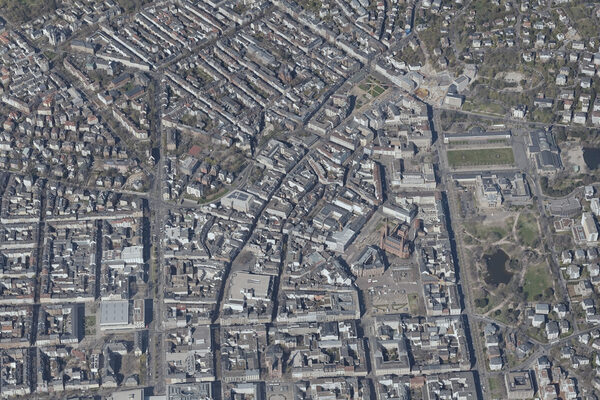Residential development
The future of housing brings new challenges: how will demand for housing develop and what space will be needed? These questions are crucial for urban planning.
Housing is a basic need for all people. However, the demands on housing and the environment in which we live have changed considerably. This also applies to the framework conditions, such as the increasing demand for living space, the development of incomes and the changes in the population and households. To ensure that the state capital of Wiesbaden continues to meet people's needs in the future, it must respond to these changes. Issues such as climate protection, health and environmental protection must be given ever greater consideration.
Wiesbaden is characterized by a diverse and varied structure. The wooded slopes of the Taunus, the stream valleys, the numerous springs and the Rhine give the city its unique appearance. With twenty districts and six central districts, each with its own character, every part of Wiesbaden contributes to the special charm of the state capital.
These unique qualities should be preserved in the future, but at the same time careful and sustainable further development is required. The focus here is on preserving the residential value while at the same time improving the quality of life and environmental conditions.
Population development and housing demand
Wiesbaden's population has already grown steadily in recent years. According to projections by the Office for Statistics and Urban Research from 2023, Wiesbaden's population will grow by around 29,000 inhabitants by 2040. Taking into account demographic developments and the ongoing demand for housing, this will result in a need for additional residential building land.
Steady population growth!
In order to ensure a sustainable supply of building land for broad sections of the population, it is strategically important in terms of sustainable settlement development to provide building land in sufficient quantity and quality and to realize existing residential building land potential. Land use planning and the building land register are components of this strategy.
On October 31, 2019, the City Council resolved to draw up a new land use plan for Wiesbaden. This continues the path that was started with the integrated urban development concept in order to drive forward the future-oriented and sustainable urban development of Wiesbaden in the growing Rhine-Main metropolitan region.
Downloads
Further information
Urban planning office
Address
65189 Wiesbaden
Postal address
65029 Wiesbaden
Arrival
Notes on public transport
Bus stop Statistisches Bundesamt; bus lines 16, 22, 27, 28, 37, 45, X26, x72, 262
Telephone
Opening hours
Please make an appointment.
Information on accessibility
- Barrier-free access is available
- The WC is barrier-free
